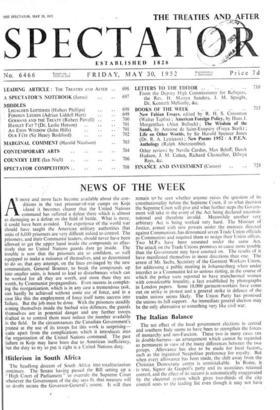NEWS OF THE WEEK A S more and more facts become available
about the con- ditions in the vast prisoner-of-war camps on Koje island it becomes clearer that the United Nations command has suffered a defeat there which is almost as damaging as a defeat on the field of battle. What is more, it could have been avoided. The experience of the world war should have taught the American military authorities that units of 6,000 prisoners are very difficult indeed to control. The prisoners, and their Communist leaders, should never have been allowed to get the upper hand inside the compounds so effec- tively that no United Nations guards dare go inside. The trouble is now that the prisoners are so confident, so well equipped to make a nuisance of themselves, and so determined to do so, that any attempt, on the lines envisaged by the new commandant, General Boatner, to break the compounds up into smaller units, is bound to lead to disturbances which can be worked for all they are worth, and more than they are worth, by Communist propagandists. Even success in complet- ing the reorganisation, which is in any case a tremendous task, can hardly be achieved without some use of force, and in a case like this the employment of force itself turns, success into failure. But the job must be done. With the prisoners steadily arming themselves inside the barbed wire defences, the guards themselves are in potential danger and any further troops drafted in to control them must reduce the number available in the field. In the circumstances the Canadian Government's protest at the use of its troops for this work is surprising— quite apart from the complications which it introduces into the organisation of the United Nations command. The past failure in Koje may have been due to American inefficiency, but the duty to try to put it right is a United Nations duty.










































